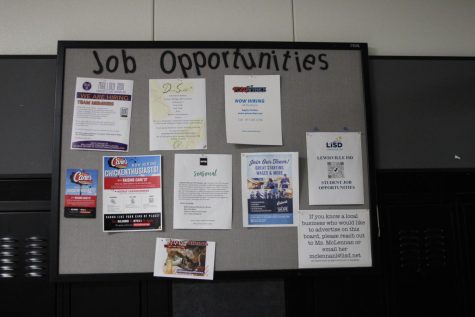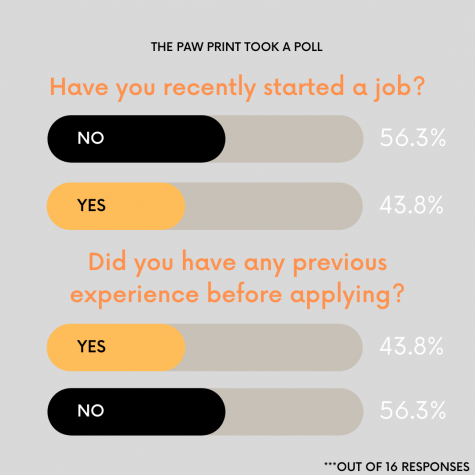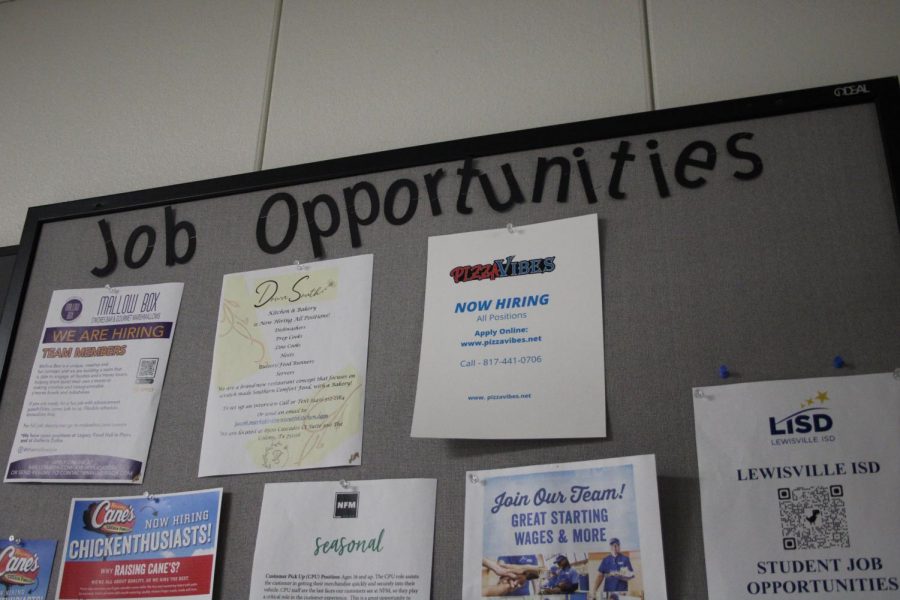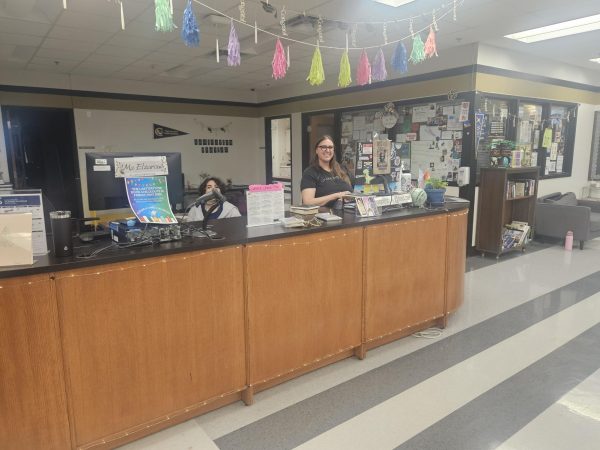The Great Resignation: What does it Mean For Us?
Job posting board in cafeteria advertising more opportunities than usual for high school students due to COVID 19 labor shortages.
March 2020. Something’s missing.
Busses weren’t coming to their usual stops, children with backpacks weren’t filling up the sidewalks on their way from school.
Something was missing. Cars were almost a rare sight in the busiest of cities.
Something was missing.
Employees are missing.
The US entered the Great Resignation after data for July 2021 revealed the jump in unemployment rates.
“The obvious answer is COVID,” Director of Economic Development for The Colony, Diane Lemmons said. “The pandemic highlighted some of the frustrations for service workers across the US.”
“Now Hiring” signs are posted nearly everywhere you go. Competition is low, in fact, many businesses have changed their criteria for hirees.
“[Amc] used to only hire 14 year olds in the summer,” Junior Hannah Schwegman said. “Now they hire them all year.”
Many have even started to offer incentives to gain more appeal to job seekers. Lemmons said that the city offers a benefits package.
“It forced employers in the industry to take a look at their policies, wages, and overall structure.” Lemmons said.
How did it get this bad? How can it be fixed?
As mentioned before, COVID brought on a lot of hardships for everyone. Service industry workers became frustrated and over-worked, businesses were forced to edit their policies in order to keep workers. In fact, teachers especially were pushed to their limits by being forced to work in person, regardless.
“On the last business day of October, the number of job openings increased to 11.0 million,” Bureau of Labor Statistics reports*. “Job openings increased in several industries with the largest increases in accommodation and food services by 254,000.”
Not only did it bring hardships, for some it offered a new opportunity. Lemmons described it as an opportunity for people to hit the reset button. People were given the opportunity to take a look into what they were doing and discover if this was something they had wanted to do for the rest of their life.
“A lot of people started companies while others decided to speak specific training,” Lemmons said. “This also spurred a lot of retirements, in particular the ‘Baby Boomers’.”
Many teens have started entering the retail/hospitality industry as of late. Here at TCHS, out of 16 responses on the survey, 43% have begun working. Out of that statistic, 56% of them had no prior experience. The daunting feeling surrounding applications has been alleviated quite a bit as the process has become almost exclusively online.

“I was scrolling through FaceBook and saw they were hiring front desk help,” Junior Shawn Parker said. “So I messaged them through messenger and they said to email them, so I did.”
From thereon, the process included a paragraph and resume, and eventually an interview. Many teens have similar experiences. Some say that all they had to do was submit the application and were almost always hired on the spot when called in.
For the current age group we are at TCHS, finding income is the goal for many. Some like to have money to save, while others may use it for more personal reasons, like buying gifts for friends or themselves.
“I started working because, one, I need money,” Senior Audrey Sharek said. “And because it helps with responsibility. I’ve felt that getting a job has helped with my maturity.”
While the pandemic has influenced the economy heavily, this opens opportunities for the younger generations. As workplaces are having to change policies in order to fill job vacancies, teens looking for employment can join the workforce almost immediately and enter with a good starting pay.
“I got hired at $5 per hour,” Sharek said. “Recently, they’ve been hiring and starting at $9-10.”
If your concern lies in your scheduling, many places are becoming more lenient, especially with all the people quitting. Schwegman relays seeing people coming in late or not calling in without consequence, due to the times we are currently in. Many places will be willing to work with you as long as you communicate with them, especially now.
“They’re flexible with schedules if you put your days you have to miss in advance,” Schwegman said. “If you do it only a few days in advance, they’ll say no.”
Many places have become less critical for their criteria, so many high schoolers have not had a hard time finding employment. In fact, some chains like Taco Bell are even searching for teens. Last year, they brought a food truck and DJ to our campus to advertise that they were needing workers.
If you are seeking employment, it’s critical that it’s done now. Lemmons says that not only are there many opportunities, but also that you enter with better wages. Many places are desperate for workers, as you can see by all the signs and advertisements posted, and over 50% of employed students have even testified that the process was easy.
“I think everyone should start with the food industry,” Parker said. “And yes, they should start now.”





















